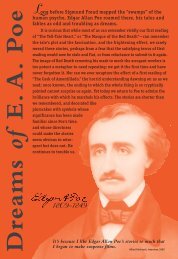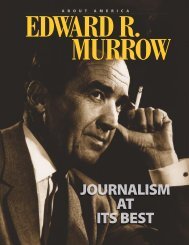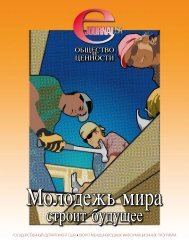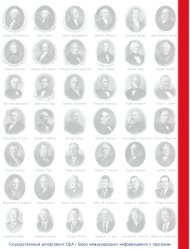AMERICAN
Outline of American Literature
Outline of American Literature
- No tags were found...
Create successful ePaper yourself
Turn your PDF publications into a flip-book with our unique Google optimized e-Paper software.
veiled account of the life of<br />
Bellow’s friend Alan Bloom, the<br />
best-selling author of The Closing<br />
of the American Mind (1987), a<br />
conservative attack on the academy<br />
for a perceived erosion of standards<br />
in American cultural life.<br />
Bellow’s Seize the Day (1956) is<br />
a brilliant novella centered on a<br />
failed businessman, Tommy<br />
Wilhelm, who is so consumed by<br />
feelings of inadequacy that he<br />
becomes totally inadequate — a<br />
failure with women, jobs,<br />
machines, and the commodities<br />
market, where he loses all his<br />
money. Wilhelm is an example of<br />
the schlemiel of Jewish folklore —<br />
one to whom unlucky things<br />
inevitably happen.<br />
Bernard Malamud<br />
(1914-1986)<br />
Bernard Malamud was born in<br />
New York City to Russian-Jewish<br />
immigrant parents. In his second<br />
novel, The Assistant (1957),<br />
Malamud found his characteristic<br />
themes — man’s struggle to survive<br />
against all odds, and the ethical<br />
underpinnings of recent Jewish<br />
immigrants.<br />
Malamud’s first published<br />
work was The Natural<br />
(1952), a combination of<br />
realism and fantasy set in the mythic<br />
world of professional baseball.<br />
Other novels include A New Life<br />
(1961), The Fixer (1966), Pictures<br />
of Fidelman (1969), and The<br />
Tenants (1971).<br />
Malamud also was a prolific master<br />
of short fiction. Through his<br />
BERNARD MALAMUD<br />
Photo © Nancy Crampton<br />
stories in collections such as The<br />
Magic Barrel (1958), Idiots First<br />
(1963), and Rembrandt’s Hat<br />
(1973), he conveyed — more than<br />
any other American-born writer —<br />
a sense of the Jewish present and<br />
past, the real and the surreal, fact<br />
and legend.<br />
Malamud’s monumental work —<br />
for which he was awarded the<br />
Pulitzer Prize and National Book<br />
Award — is The Fixer. Set in Russia<br />
around the turn of the 20th century,<br />
it is a thinly veiled look at an actual<br />
case of blood libel — the infamous<br />
1913 trial of Mendel Beiliss, a dark,<br />
anti-Semitic blotch on modern history.<br />
As in many of his writings,<br />
Malamud underscores the suffering<br />
of his hero, Yakob Bok, and the<br />
struggle against all odds to endure.<br />
Isaac Bashevis Singer<br />
(1904-1991)<br />
Nobel Prize-winning novelist and<br />
short story master Isaac Bashevis<br />
Singer — a native of Poland who<br />
immigrated to the United States in<br />
1935 — was the son of the prominent<br />
head of a rabbinical court in<br />
Warsaw. Writing in Yiddish all his<br />
life, he dealt in mythic and realistic<br />
terms with two specific groups of<br />
Jews — the denizens of the Old<br />
World shtetls (small villages) and<br />
the ocean-tossed 20th-century emigrés<br />
of the pre-World War II and<br />
postwar eras.<br />
Singer’s writings served as bookends<br />
for the Holocaust. On the one<br />
hand, he described — in novels such<br />
as The Manor (1967) and The Estate<br />
(1969), set in 19th-century Russia,<br />
104
















